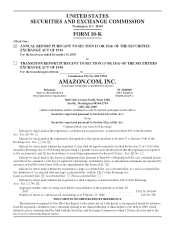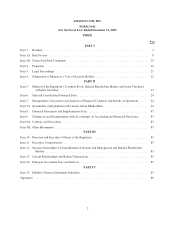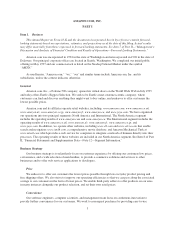Amazon.com 2005 Annual Report Download - page 19
Download and view the complete annual report
Please find page 19 of the 2005 Amazon.com annual report below. You can navigate through the pages in the report by either clicking on the pages listed below, or by using the keyword search tool below to find specific information within the annual report.• restrictive governmental actions (such as trade protection measures, including export duties and quotas
and custom duties and tariffs) and restrictions on the level of foreign ownership;
• restrictions on sales of certain products or services and uncertainty regarding our liability for the
products or services we offer and content provided by us or our users, including uncertainty as a result
of less Internet-friendly legal systems, local laws, lack of legal precedent, and varying rules, regulations,
and practices regarding the distribution of media products and enforcement of intellectual property
rights;
• import, export, or other business licensing requirements;
• limitations on the repatriation of funds and foreign currency exchange restrictions;
• difficulty in obtaining distribution and support;
• nationalization or restrictions on foreign ownership;
• shorter payable and longer receivable cycles and the resultant negative impact on cash flow;
• consumer and data protection laws and restrictions on pricing or discounts;
• lower levels of adoption or use of the Internet and other technologies vital to our business and the lack
of appropriate infrastructure to support widespread Internet usage;
• lower levels of consumer spending on a per capita basis and fewer opportunities for growth in certain
foreign market segments compared to the U.S.;
• lower levels of credit card usage and increased payment risk;
• difficulty in staffing, developing and managing a number of unique foreign operations as a result of
distance, language and cultural differences;
• different employee/employer relationships and the existence of workers’ councils and labor unions;
• laws and policies of the U.S. and other jurisdictions affecting trade, foreign investment, and loans;
• tax and other laws of the U.S. and other jurisdictions; and
• geopolitical events, including war and terrorism.
As the international e-commerce channel continues to grow, competition will likely intensify. Local
companies may have a substantial competitive advantage because of their greater understanding of, and focus on,
the local customer, as well as their more established local brand name recognition. In addition, governments in
foreign jurisdictions may regulate e-commerce or other online services in such areas as licenses, content, privacy,
network security, copyright, encryption, taxation, or distribution. We may not be able to hire, train, retain,
motivate, and manage required personnel, which may limit our growth in international market segments.
In 2004, we acquired Joyo.com, which is organized under the laws of the British Virgin Islands and operates
www.joyo.com and www.joyo.com.cn in the People’s Republic of China (“PRC”) in cooperation with a PRC
subsidiary and PRC affiliates. The PRC regulates Joyo.com’s business through regulations and license
requirements restricting (i) the scope of foreign investment in the Internet, retail and delivery sectors, (ii) Internet
content and (iii) the sale of certain media products. In order to meet the PRC local ownership and regulatory
licensing requirements, Joyo.com’s business is operated through a PRC subsidiary which acts in cooperation with
PRC companies owned by nominee shareholders who are PRC nationals. Although we believe Joyo.com’s
structure complies with existing PRC laws, it involves unique risks. There are substantial uncertainties regarding
the interpretation of PRC laws and regulations, and it is possible that the PRC government will ultimately take a
view contrary to ours. If Joyo.com or its subsidiary or affiliates were found to be in violation of any existing or
future PRC laws or regulations or if interpretations of those laws and regulations were to change, the business
could be subject to fines and other financial penalties, have its licenses revoked or be forced to shut down
entirely. In addition, if Joyo.com were unable to enforce its contractual relationships with respect to management
11
























